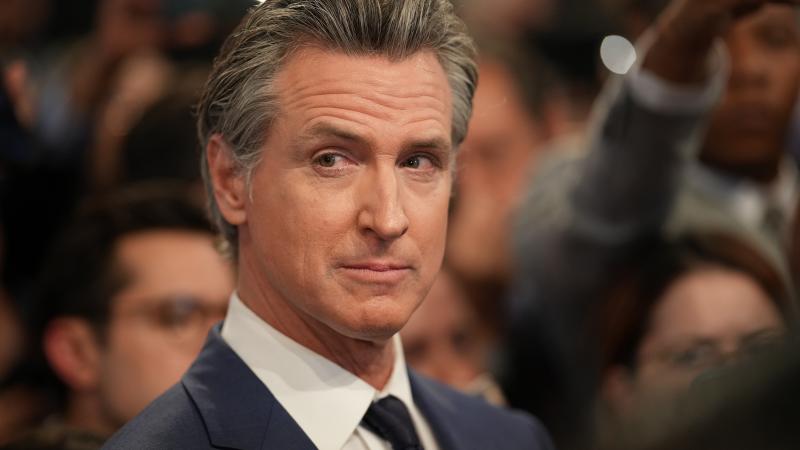The Biden Cabinet nominee who can't seem to get her math straight
Deb Haaland wants to be the first Native American Cabinet secretary overseeing the multibillion dollar public lands infrastructure. But she's fumbled her personal finances during the Senate confirmation process.
Rep. Deb Haaland (D-N.M.) is one step closer to overseeing the federal agency that manages about a half-billion acres of public lands and national parks, a $12 billion-plus budget, 70,000 employees and the leases for more than 96,000 oil and gas wells that produce nearly 10% of the nation's energy and generate billions of dollars per year in federal revenues.
In other words, the Department of the Interior wrestles routinely with budgeting and bookkeeping challenges and complex financial transactions and analysis on daunting scales. And that has some senators reviewing Haaland's nomination to be Interior Secretary feeling a bit uneasy.
The reason?
Haaland, who would be the first Native American Cabinet secretary if confirmed, has struggled to accurately account for even her own modest personal finances, offering Congress four different versions of how much income she earned during her last year in the private sector in 2018 before she joined Congress.
The second-term House member has also confessed to skipping her 2018 tax return, then filing it belatedly in December as her nomination was being vetted.
Depending on which version of Haaland's federal ethics reports and amended disclosures you pick, she made as much as $46,000 in income or as little as $2,250 in 2018, even as she crisscrossed New Mexico campaigning for Congress. Her lowest estimate puts her annual income at one-fifth the poverty level.
Haaland's office did not respond to repeated calls and emails seeking comment.
Some Republican senators, including ranking member of the Senate Energy and Natural Resources Committee John Barrasso of Wyoming, say they believe Haaland has provided inaccurate, incomplete or evasive answers to questions, from her finances to policy issues.
"Ranking Member Barrasso is deeply dissatisfied with the content of many of Rep. Haaland's responses to questions for the record," his office told Just the News on Friday. "Questions from Senator Barrasso and a number of Committee Members included multiple parts and her responses failed to address them."
Take, for instance, the question Haaland did not directly answer on whether the U.S. had tougher environmental standards than Russia or Nigeria. "She wouldn't even acknowledge that the United States has higher environmental standards for oil and gas production than Russia or Nigeria," Barrasso lamented.
Another time, Barrasso pressed on the impact climate change regulation might have on reducing oil and gas production worldwide.
“President Biden has justified his ban on new oil and gas leasing on federal lands and waters," Barrasso said. "He cited climate change. Are you aware of any evidence that suggests that a ban on oil and gas leasing on federal lands and waters is going to reduce the world's total production of oil and gas?"
"No, Sir," Haaland answered.
Sen. James Risch (R-Idaho) went on a Twitter rant after Haaland offered six different non-answers to his question on whether she opposed shutting down the Keystone pipeline.
"It should not take the @Interior nominee SIX times to answer whether she supports shutting down the #KeystoneXL Pipeline & why," Risch tweeted, posting the clip of Haaland's answers.
Policy dodges aside, it has been Haaland's performance on her legally required disclosures of personal income that has most angered some senators.
Officials confirmed to Just the News on Friday that Haaland belatedly filed a tax return last December for calendar year 2018 without getting an extension. Haaland recently disclosed details about her tardy tax filing in supplemental answers to her required nominee's questionnaire submitted to the Senate Energy and Natural Resources Committee.
"I filed my 2018 federal income tax return in December 2020 without an extension. In 2018, my income was $2,250," she wrote in a supplemental answer filed on Feb. 12 after Barrasso pressed for more information.
The $2,250 income figure she provided for 2018 in the supplemental answer is different than the various totals she reported in her congressional ethics forms and subsequent amendments.
Initially, when Haaland filed her first financial disclosure report as a member of Congress on May 13, 2019, she reported her only source of income in 2018 was $30,550 earned as an independent contractor for her tribe's Laguna Development Corp. She listed no liabilities on the form.
But on Jan. 5 of this year, as her nomination was being forwarded to the Senate, she filed an amendment to the 2019 form adding $16,000 in "salary" from the San Felipe Casino, a gambling outlet near Santa Fe run by the San Felipe Pueblo. The casino recently changed its name to Black Mesa Casino.
The amendment also listed student loan debts of between $15,001 and $50,000 that were not on her original 2019 form.
Then last week, Haaland again amended her 2019 financial disclosure report, eliminating the $16,000 in salary in 2018 from the San Felipe Casino and reducing the amount she claimed she was paid by the Laguna Development Corp. to $2,250 from $30,550 while adding $1,641 in income from a previously unlisted "John Hancock retirement distribution." That report put her 2018 income at $3,891, or less than a third of the federal poverty level for an individual in 2018.
Despite lingering questions about the accuracy of her legally required financial disclosures, the Senate panel endorsed her nomination Thursday by an 11-9 margin, sending it to the full Senate.
Haaland has apologized to senators for what she said were mistakes in reporting her income, but did not offer a fuller explanation for why her 2018 income estimates have kept changing as her nomination advances.
"To the extent that financial disclosure filings to the United States House of Representatives include inadvertent errors, I will correct them as soon as possible," she wrote in a response to one of Barrasso's set of questions.
As for the tax filing, she suggested to senators that she made it in December as her nomination was being vetted, uncertain whether she earned enough income to warrant filing a return.
"I respectfully inform the Committee that I requested an IRS compliance review and was subsequently informed by the IRS that I may not have had a federal tax filing obligation in 2018 based on my reported income," she wrote Barrasso.















